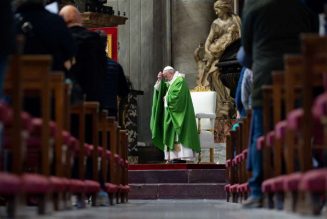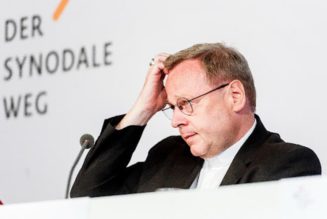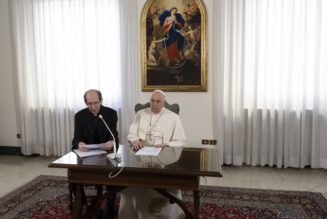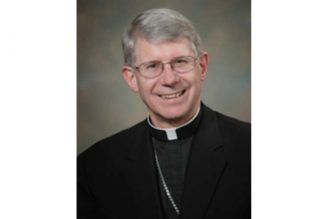A large Byzantine cross with three transverse arms hung above the outdoor altar in Prešov, flanked by an icon of Mary, Mother of God, and the Christ the Teacher icon.

“‘We proclaim Christ crucified … the power of God and the wisdom of God.’ So St. Paul tells us, but he does not hide the fact that, in terms of human wisdom, the Cross appears as something completely different: it is ‘scandal’ and ‘foolishness,’” the pope said in his homily.
“The cross was an instrument of death, yet it became the source of life. It was a horrendous sight, yet it revealed to us the beauty of God’s love. That is why, in today’s feast, the people of God venerate the Cross and the Liturgy celebrates it.”
The feast of the Exaltation of the Holy Cross dates back to the 4th century, when the solemn consecration of the Church of the Holy Sepulchre took place on Sept. 13, 335, at the site of Christ’s crucifixion in Jerusalem.

“We can fail to accept, except perhaps in words, a weak and crucified God, and prefer instead to dream of a God who is powerful and triumphant. This is a great temptation,” Pope Francis said.

“How often do we long for a Christianity of winners, a triumphalist Christianity that is important and influential, that receives glory and honor? Yet a Christianity without a cross is a worldly Christianity, and shows itself to be sterile.”

Pope Francis arrived at the Divine Liturgy in Prešov in the popemobile, which passed through crowds of people standing along the streets waving Vatican flags. Around 40,000 people attended the liturgy, according to local authorities.
(Story continues below)
Prešov was part of the Kingdom of Hungary until the mid 20th century and is home to many of the country’s more than 200,000 Ruthenian Byzantine Catholics.
The Ruthenian Catholic Church is one of 23 Eastern Catholic Churches in communion with the Holy See.

In April, Byzantine Catholics in Slovakia and around the world celebrated the 375th anniversary of the Union of Uzhhorod, an agreement that brought the Ruthenian Orthodox Church into communion with the pope after nearly six centuries of schism.

Since the Union of Uzhhorod, eparchies have been created to shepherd Ruthenian Catholics wherever they live, including the Metropolitan Eparchy of Pittsburgh and its three suffragan eparchies in the United States, and the Metropolitan Eparchy of Prešov in Slovakia with its suffragans, as well as a Slovakian eparchy in Canada.
Join Our Telegram Group : Salvation & Prosperity






